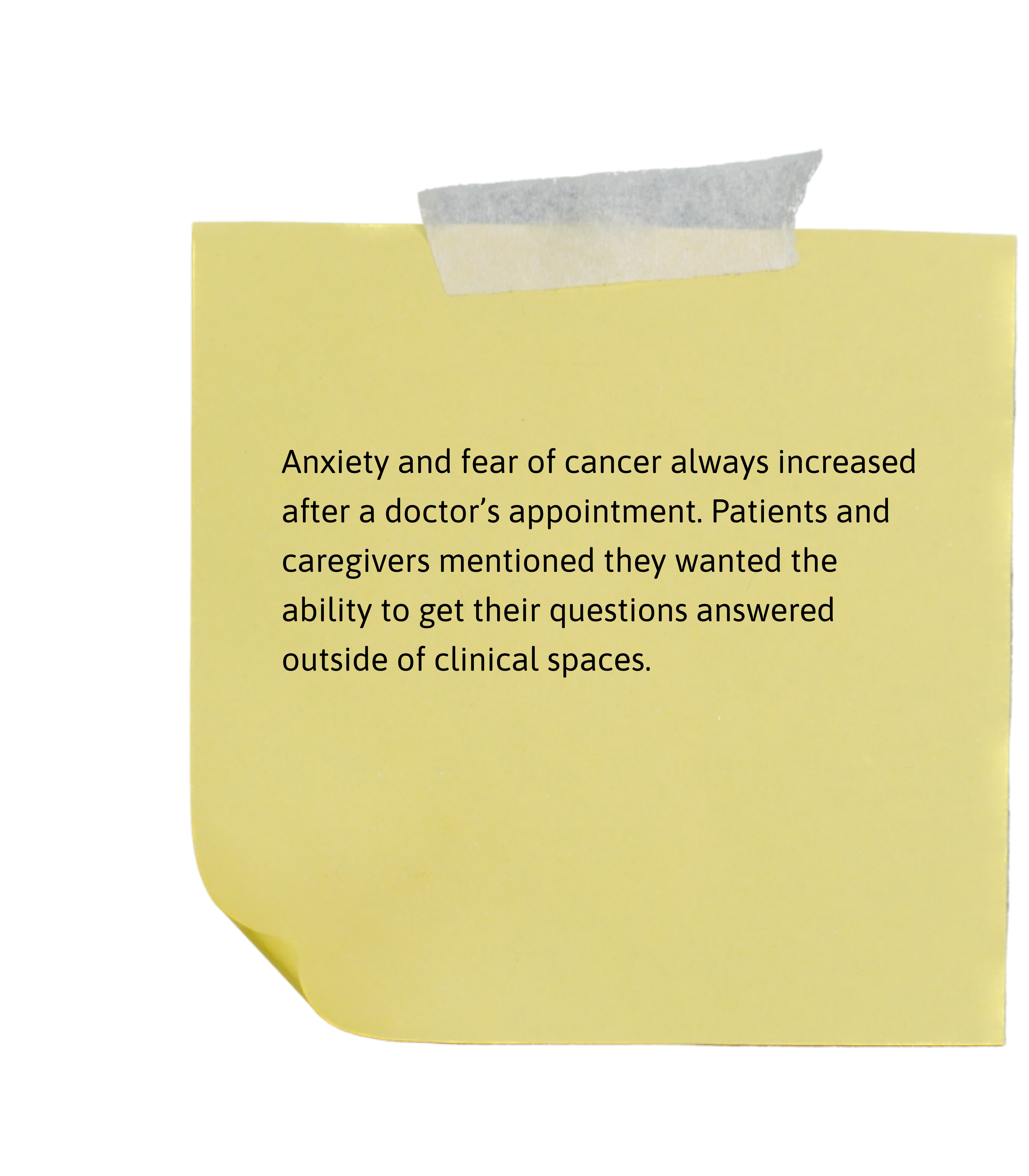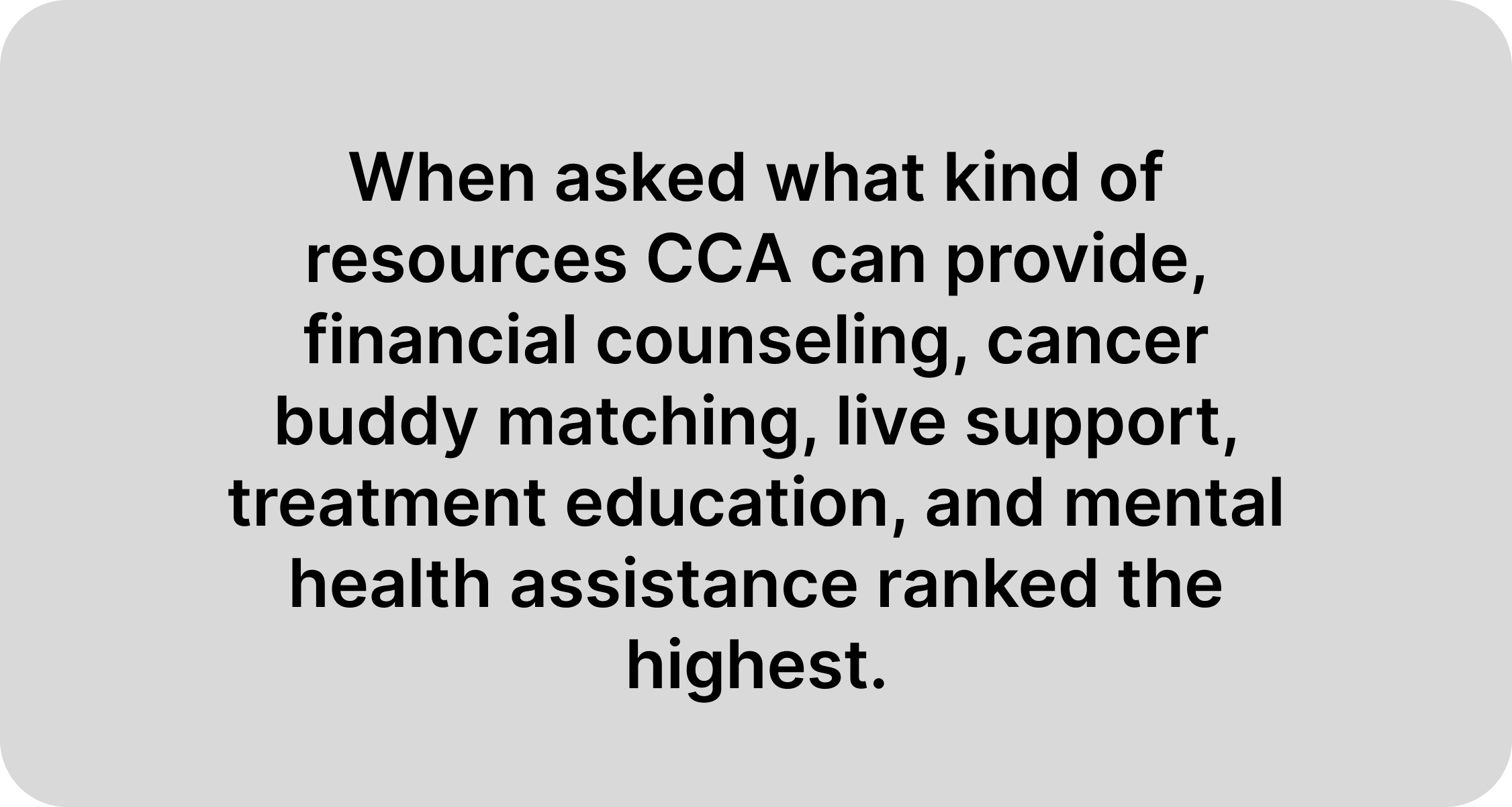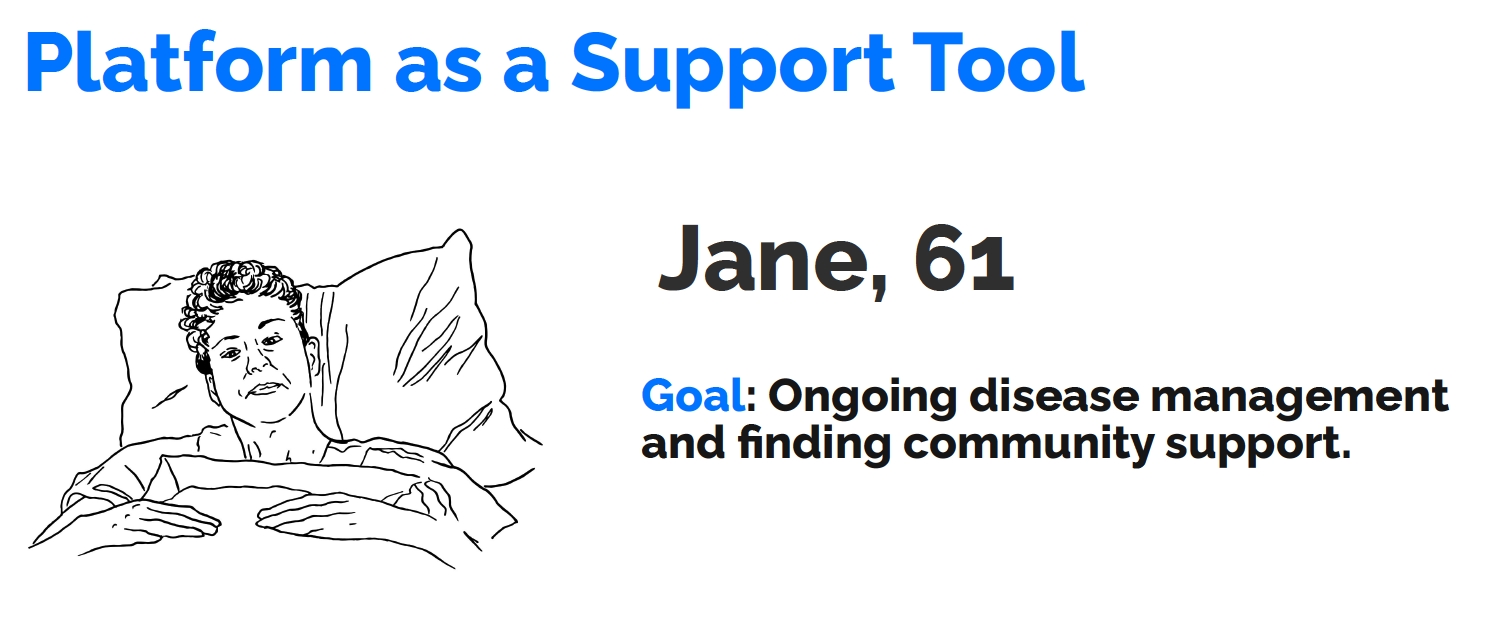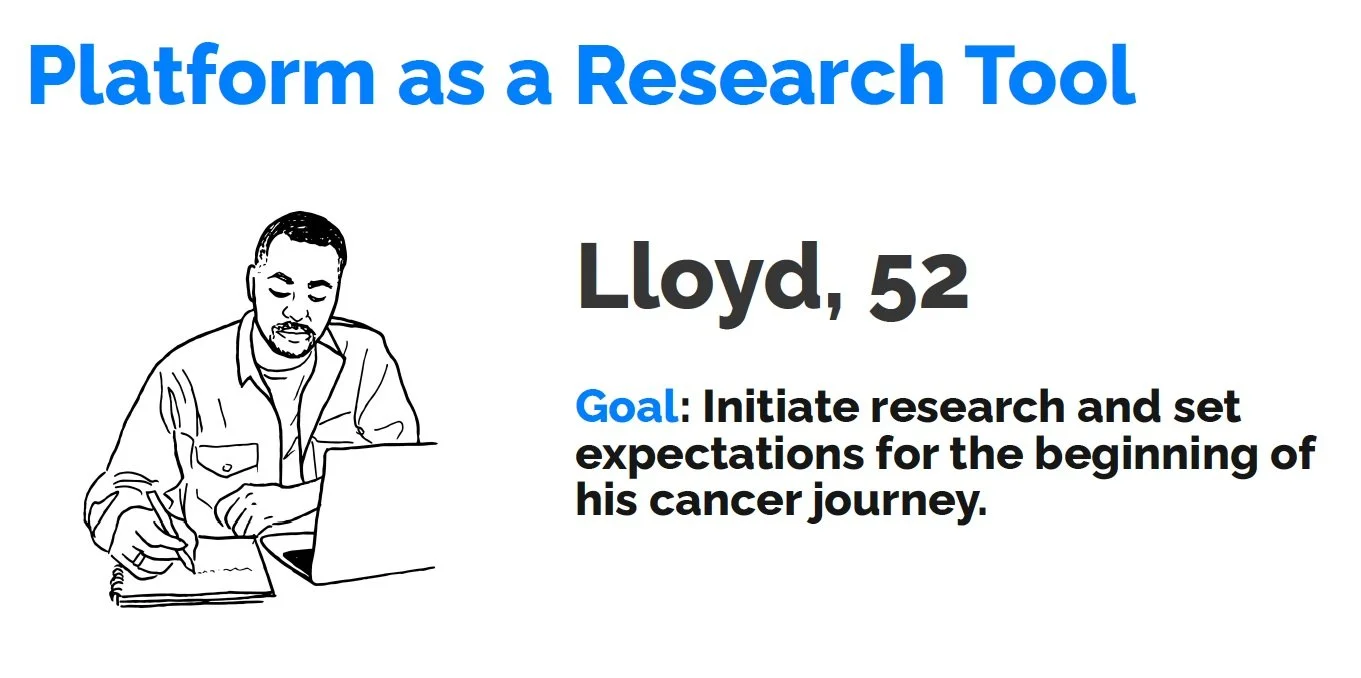Creating a support platform informed by lived experience for all those affected by colorectal cancer.
UX Strategy/ Research/ Design
Role: UX and Strategy Lead
Team: Strategist, Project Manager, Developer, Salesforce Specialist, UI Designer
Timeline: 2023- 2024
Client: Colorectal Cancer Alliance (CCA)
OVERVIEW
Blue HQ is a tool for patients and caregivers to manage their disease and symptoms. This portal connects people affected by colorectal cancer with live peer support, education, clinical trials, screenings and daily task management. This engagement began with a discovery period to align the product with actual needs of patients and caregivers, design phase to outline UI, and development to build the product.
Colorectal Cancer Alliance is the largest and oldest colorectal cancer non-profit organization in the US. The Colorectal Cancer Alliance offers a variety of patient support services including grant programs, monthly webinars, a helpline, chat forum and a Buddy Program, which provides both survivors and caregivers with a chance to connect with someone who has gone through a similar experience.
BLUEHQ IMPACT
+124% increase in pre-screening and colonoscopy registrations
87% increase in buddy matching program
Over 12,000 active platform users in first month of launch
My survey research was published in JCO Oncology Practice here
RESEARCH
Who is affected by colorectal cancer?
As a child of a parent who has gone through cancer, I understood that a diagnosis is not the start of the cancer journey. It begins way before cancer is detected and doesn’t end after it has left.
In order to understand who we were building this tool for we had to identify who is impacted by colorectal cancer.
Who did we talk to?
6 oncologists & gastroenterologists
It was important to talk to providers to understand how they went about diagnosis and treatment and the communication and education they provided patients during this time.
5 caregivers of varying ages
Caregivers come in the form of many shapes, ages, and relationships. We wanted to talk to people who are currently supporting a loved one with colorectal cancer to understand how a portal could help them in their own lives.
12 patients actively seeking treatment
At the heart of this portal were our patients. We wanted to empathize with them and understand not only what their cancer journey looked like but also how they felt and what day-to-day life looked for them.
4 people with family history
While this portal was intended for patients of colorectal cancer, prevention was a big part of the work CCA did. We wanted to find opportunities for those who wanted to be better advocates of their health to benefit from this portal as well.
4 CCA patient and family navigators
Lastly, CCA already had a team of navigators that supported people who came to them for help. We wanted to lear - how can we connect more people to this service and what kind of support are people actively seeking from them?
6 people who were in remission or considered NED
We included people post-treatment knowing that they may still have the same fears and anxieties about their lives even after completing treatment.
All interview data was organized in a singular Miro board for collaboration
The most surprising things we heard
Leveraging surveys to better understand insights
THE OPPORTUNITY
How might we create a personalized patient and caregiver support portal that provides personalized disease education, financial help, peer support, genetic testing information and opportunity to search clinical trials?
STRATEGY
Creating a solution rooted in empathy
In order to define our platform, we wanted to put ourselves in the shoes of those who would need it most. To do this, we mapped a future state for two different journeys. One for someone who has just been diagnosed with colon cancer and seeking education and someone who finds CCA after a diagnosis seeking community support.
DESIGN
What does this portal look like?
Build awareness
Allow high risk individuals to join and advocate for themselves through the CCA community
Create more engagement with CCA events and resources
Ensure that people are aware that this is a preventable disease
Educate
Create pathways of information for people based on where they are in their cancer journey
Serve as a tool to manage everyday tasks and be recognized for them
Help people find clinical trials they would qualify for
Support
Create a sense of community for those affected by colorectal cancer where their voice is heard, respected, and validated
Provide a space for patients and caregivers to meet others just like them
Bring visibility to CCA’s existing buddy matching and navigator programs
Provide financial help
3
USABILITY TESTING
Provide an embed for live chat with support navigators
Allow people to take notes, keep track of daily tasks, and draft questions to doctor
6
We knew early on that creating a platform that did everything we wanted it to do would be costly. This resulted in a three year roadmap for iterative development. What you see above is a goal for the future. In order to understand what we could build now, we conducted a moderated usability test with patients and caregivers that resulted in prioritizing the following features based on their input and technical feasibility.
The MVP would need to:
1
5
Connect to CCA’s existing Ally to Ally program and Blue Hope Nation Facebook group through an API
4
Seamless integration with Salesforce CRM for support navigators
2
Have some sort of filterable resource repository that would be based on selections made while creating a profile
Act as a tool for caregivers in receiving peer support and clinical research opportunities
Houston, we have a solution!
“Thank you for this. I’ve learned to be hopeful and that I’m brave enough to handle whatever happens.”
“As a young female. It’s tough in the moment when you just get bad news after bad news, but this takes away some of that burden”

